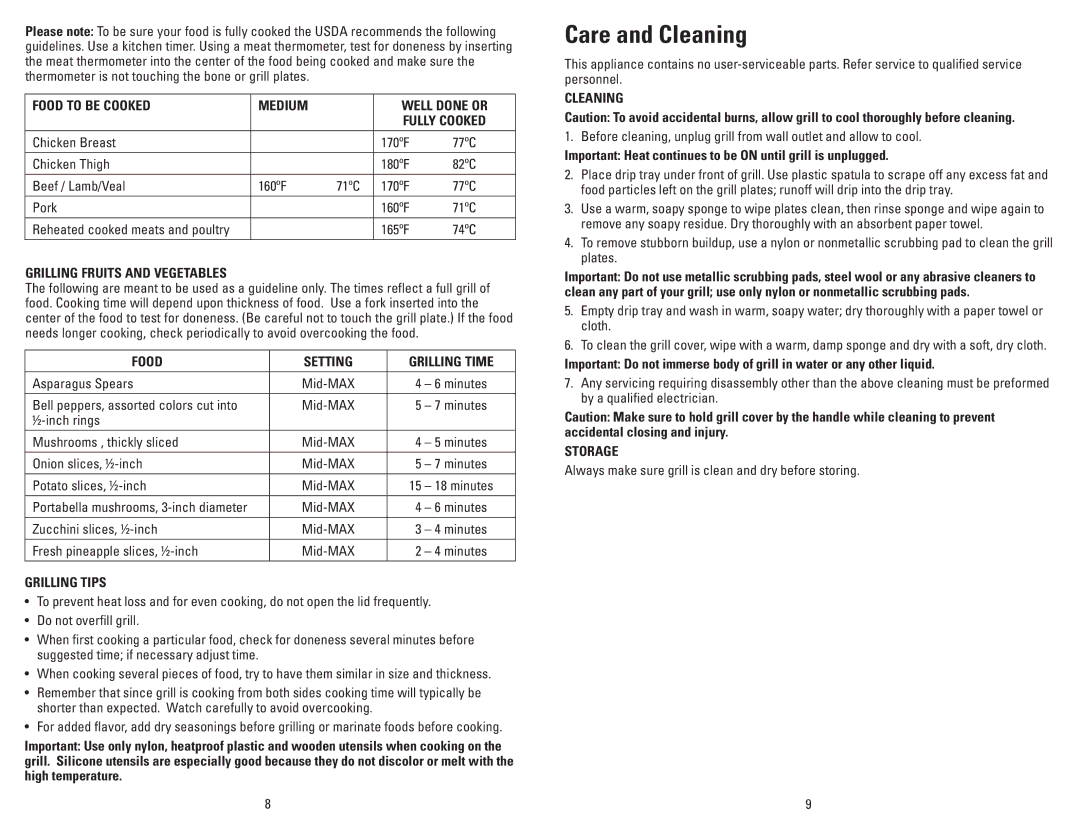Please note: To be sure your food is fully cooked the USDA recommends the following guidelines. Use a kitchen timer. Using a meat thermometer, test for doneness by inserting the meat thermometer into the center of the food being cooked and make sure the thermometer is not touching the bone or grill plates.
FOOD TO BE COOKED | MEDIUM |
| WELL DONE OR | |
|
|
| FULLY COOKED | |
|
|
|
|
|
Chicken Breast |
|
| 170ºF | 77ºC |
|
|
|
|
|
Chicken Thigh |
|
| 180ºF | 82ºC |
Beef / Lamb/Veal | 160ºF | 71ºC | 170ºF | 77ºC |
|
|
|
|
|
Pork |
|
| 160ºF | 71ºC |
|
|
|
|
|
Reheated cooked meats and poultry |
|
| 165ºF | 74ºC |
|
|
|
|
|
GRILLING FRUITS AND VEGETABLES
The following are meant to be used as a guideline only. The times reflect a full grill of food. Cooking time will depend upon thickness of food. Use a fork inserted into the center of the food to test for doneness. (Be careful not to touch the grill plate.) If the food needs longer cooking, check periodically to avoid overcooking the food.
FOOD | SETTING | GRILLING TIME | |
Asparagus Spears | 4 | – 6 minutes | |
|
|
|
|
Bell peppers, assorted colors cut into | 5 | – 7 minutes | |
|
|
| |
Mushrooms , thickly sliced | 4 | – 5 minutes | |
|
|
|
|
Onion slices, | 5 | – 7 minutes | |
Potato slices, | 15 | – 18 minutes | |
|
|
|
|
Portabella mushrooms, | 4 | – 6 minutes | |
|
|
|
|
Zucchini slices, | 3 | – 4 minutes | |
Fresh pineapple slices, | 2 | – 4 minutes | |
|
|
|
|
GRILLING TIPS
•To prevent heat loss and for even cooking, do not open the lid frequently.
•Do not overfill grill.
•When first cooking a particular food, check for doneness several minutes before suggested time; if necessary adjust time.
•When cooking several pieces of food, try to have them similar in size and thickness.
•Remember that since grill is cooking from both sides cooking time will typically be shorter than expected. Watch carefully to avoid overcooking.
•For added flavor, add dry seasonings before grilling or marinate foods before cooking.
Important: Use only nylon, heatproof plastic and wooden utensils when cooking on the grill. Silicone utensils are especially good because they do not discolor or melt with the high temperature.
Care and Cleaning
This appliance contains no
CLEANING
Caution: To avoid accidental burns, allow grill to cool thoroughly before cleaning.
1.Before cleaning, unplug grill from wall outlet and allow to cool.
Important: Heat continues to be ON until grill is unplugged.
2.Place drip tray under front of grill. Use plastic spatula to scrape off any excess fat and food particles left on the grill plates; runoff will drip into the drip tray.
3.Use a warm, soapy sponge to wipe plates clean, then rinse sponge and wipe again to remove any soapy residue. Dry thoroughly with an absorbent paper towel.
4.To remove stubborn buildup, use a nylon or nonmetallic scrubbing pad to clean the grill plates.
Important: Do not use metallic scrubbing pads, steel wool or any abrasive cleaners to clean any part of your grill; use only nylon or nonmetallic scrubbing pads.
5.Empty drip tray and wash in warm, soapy water; dry thoroughly with a paper towel or cloth.
6.To clean the grill cover, wipe with a warm, damp sponge and dry with a soft, dry cloth.
Important: Do not immerse body of grill in water or any other liquid.
7.Any servicing requiring disassembly other than the above cleaning must be preformed by a qualified electrician.
Caution: Make sure to hold grill cover by the handle while cleaning to prevent accidental closing and injury.
STORAGE
Always make sure grill is clean and dry before storing.
